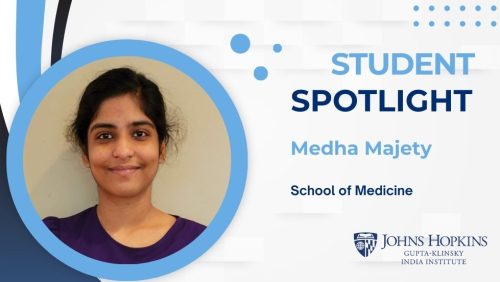
Thinking Outside the Box: Medha Majety, SOM '32
School and Major: Johns Hopkins University School of Medicine (JHU SOM)
Estimated Graduation Date: 2032
Clubs or Organizations: Co-President of the South Asian Medical Student Association (SAMSA), Member of the Refugee Health Partnership-Asylee Women Enterprise (RHP-AWE), Volunteer in Soothe
Why did you choose JHU, and what’s next for you?
JHU is one of the few institutions where there’s both diversity in the patient population and in the range of conditions patients have. Here, I have the unique opportunity to interface with patients from all walks of life and patients whose conditions could only be seen in textbooks. Additionally, I am particularly interested in several translational immunology and oncology research labs at Johns Hopkins. After medical school, I aspire to be a compassionate physician, engage in clinical/translational research, and advocate for my future patients and community.
What skills are you learning at Hopkins that will be of value your whole life?
On a cursory level, I’ve learned more effective study technique (ex. Spaced repetition, synthesizing different concepts, formulating a plan). However, the most meaningful lessons have come from conversations with patients and peers. They’ve taught me how to listen first and speak second, engage in conversations without imposing my own beliefs, and compartmentalize objective facts from a one’s story.
What unique experiences or achievements have shaped your educational journey so far?
While there’ve been several formative experiences in my educational journey, my research experience during the pandemic had a lasting impact. I initially planned on conducting a wet lab project, but the pandemic halted all in person research. My mentor, Dr. Ryan Chow, taught me several computational toolkits which I’ve continued to use and expand upon in my research career. Once in-person research resumed, I gained essential wet lab skills, and the integration of both approaches made me a stronger researcher, ultimately leading to journal publications. Most importantly, the pandemic taught me the importance of pivoting and resilience.
Are there any professors that have made a lasting impact on you?
I am deeply grateful to my undergraduate research mentors, Dr. Ryan Chow and Dr. Ariel Zhou, as well as my undergraduate physiology professor, Dr. Emile Boulpaep, and Dean María del Mar Galindo. They have consistently challenged me to think beyond the box—whether in troubleshooting experiments, interpreting a patient’s unique (and sometimes contradictory) information, or counseling first-year students through issues I may not have personally experienced. I’m also incredibly thankful to my JHU SOM advisor and professor, Dr. Arun Venkatesan, who taught me the most fundamental clinical skills and some of the more nuanced neurological concepts.